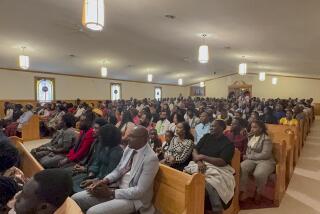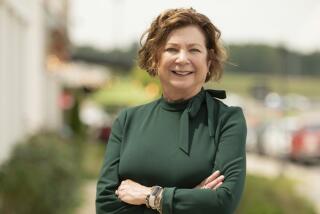Mayor Hopes to Clean Up Alabama Town
PRICHARD, Ala. — When Margie Moberg Wilson complained to her husband about poor city services, he challenged her to do something about it.
The 49-year-old real estate agent, mother of five and grandmother of five, now is nine months into a term as mayor of her financially ailing hometown, a Mobile suburb suffering from nearly two decades of white flight.
Prichard’s 38,000 residents--78% of them black--have an average income of $12,000 to $15,000. Unemployment is 13.5%, compared with 11.5% a year ago. Its 800 units of public housing have a waiting list and Wilson Avenue, the main street, is lined with boarded-up businesses.
‘Bring Solutions’
“I am determined to see this city cleaned up,” said Wilson, who has urged residents to bring solutions, not complaints to City Hall.
Offsetting her determination is the cold reality of economics. Prichard hasn’t had a printed budget since 1972, but Jim Longino, the finance director Wilson hired, said it will be $488,000 in the red this year. The city has been operating without insurance since last year.
“When you ride through downtown Prichard, you see that there is very little if any real type of retail or any other services that are generating a taxable base that would allow the city to start to grow again,” said Floyd Pough, who works in a community assistance program.
Whites began moving out with the election of Democrat A. J. Cooper, the first of three black mayors, in 1972. As whites moved out, poor blacks from north Mobile began moving in. Cooper resigned in 1980, convinced that blacks had taken control of “their own destiny,” which had been his goal.
The “mass exodus by whites that threw the situation out of balance” still continues, said the Rev. J. J. Phillips of Mount Sinai Baptist Church. He said the challenge remains poverty and the white flight that took business with it.
Eked Out Victory
“Black people want the same things as whites--nice homes, good jobs,” said Wilson, who is white. She eked out a 3,144-3,050 victory over Jesse Norwood, a black Democrat, in a runoff election in September after he defeated two-term GOP incumbent John Smith. The job pays $35,000 a year.
“Prichard is still Prichard,” regardless of who is mayor, Phillips said.
Real estate agent Paul Buchman, said Wilson hasn’t been in office long enough to judge. “She has on one or two occasions mentioned some things, but they are in the formative stages and it’s difficult to talk about.”
It’s not possible to counter poverty “until such time as they see some change in the neighborhood situation,” Buchman said. Many of the residents of a large part of the city are on welfare and “most of the households are headed by women with children.” Employed residents, including the new mayor, tend to live in the part of the city known as Eight Mile.
And regardless of who’s in City Hall, he said, it must address the areas that are “drug infested and have no money.
Crime Blamed
“The inner city is where the problem lies. Inner-city crime, and I don’t know how we’re going to stop that.”
Pough lived in Prichard for 27 years, but moved to Mobile in 1980 to buy a house that would not decline in value. “Not many people want to live in a city where you have a high rate of unemployment, and you’re not getting services from the city in terms of police protection,” he said.
His agency can help the poor and homeless in the short term, “but you get people who are out saying, ‘I need to work. Can you help me?’ . . . Once you get people who can’t find affordable housing, and jobs that will pay them a decent salary to get off welfare rolls, to work on a daily basis, they are trapped.”
More to Read
Sign up for Essential California
The most important California stories and recommendations in your inbox every morning.
You may occasionally receive promotional content from the Los Angeles Times.










